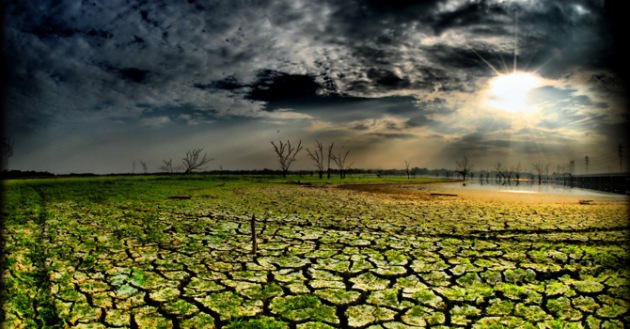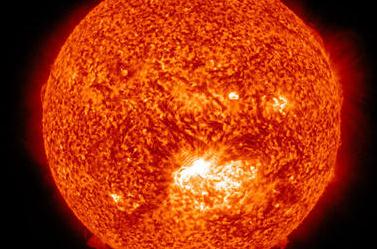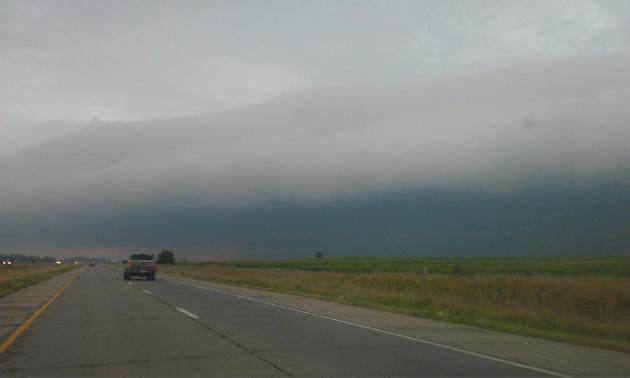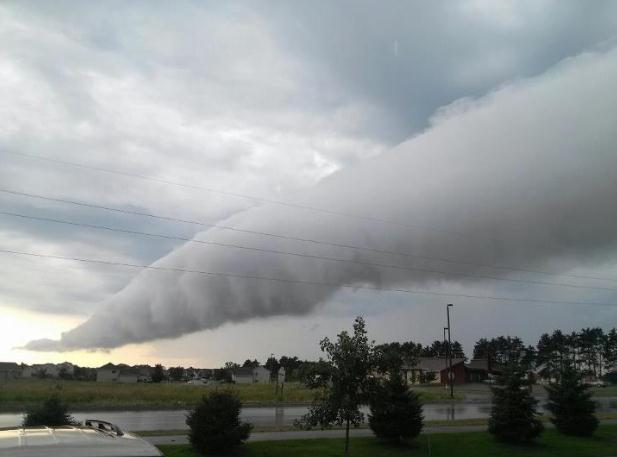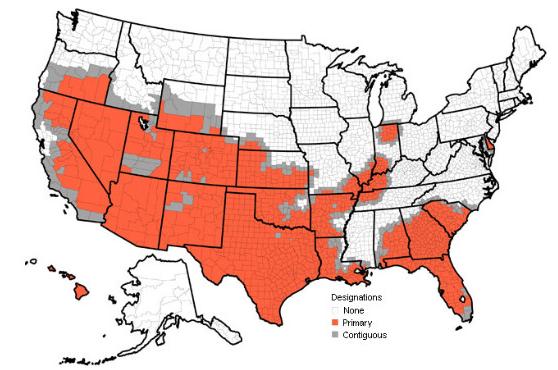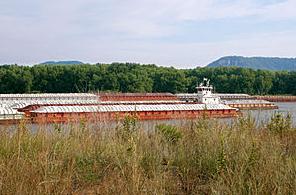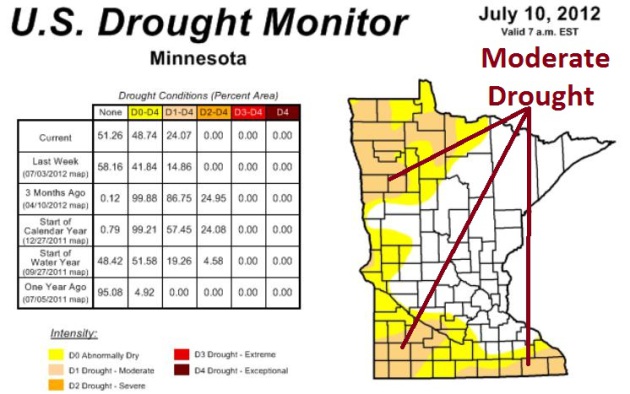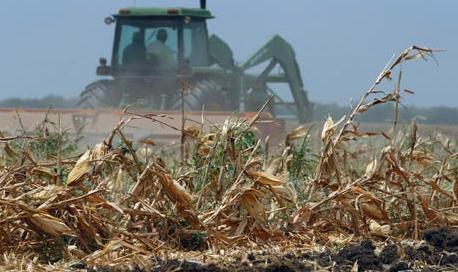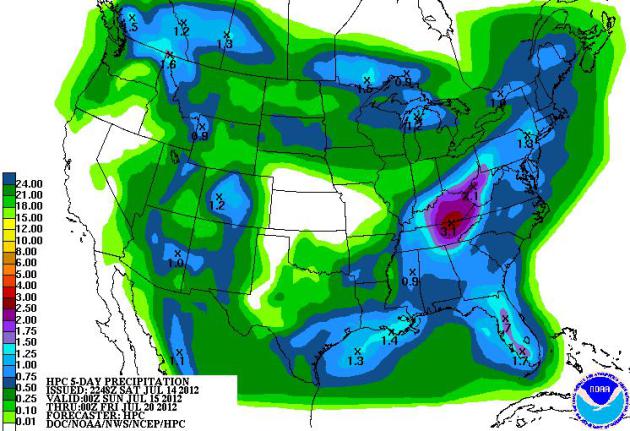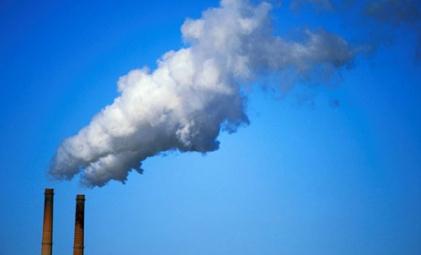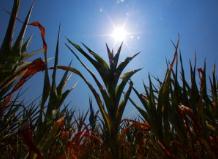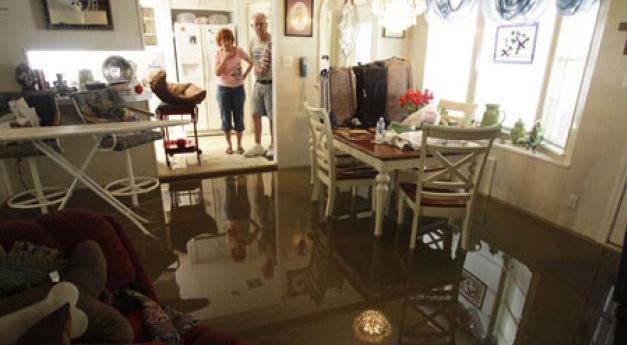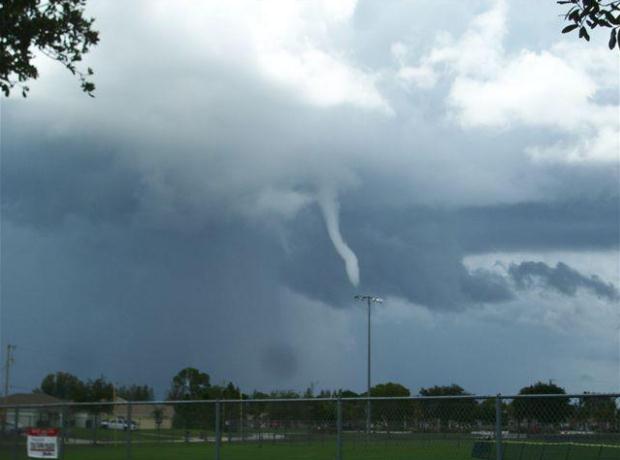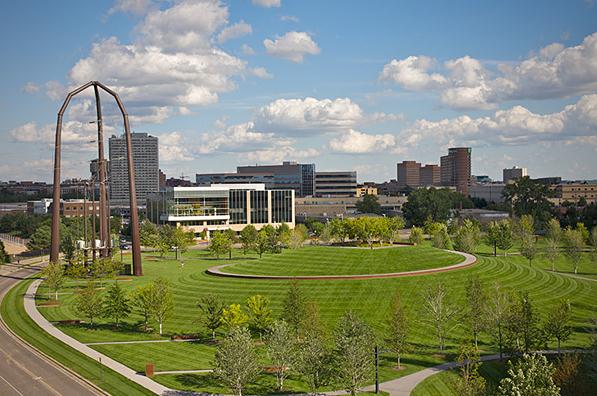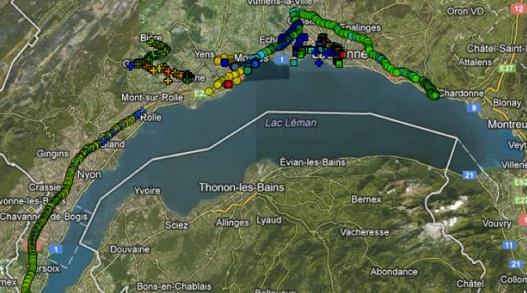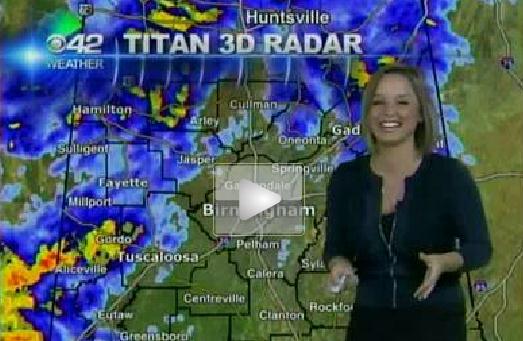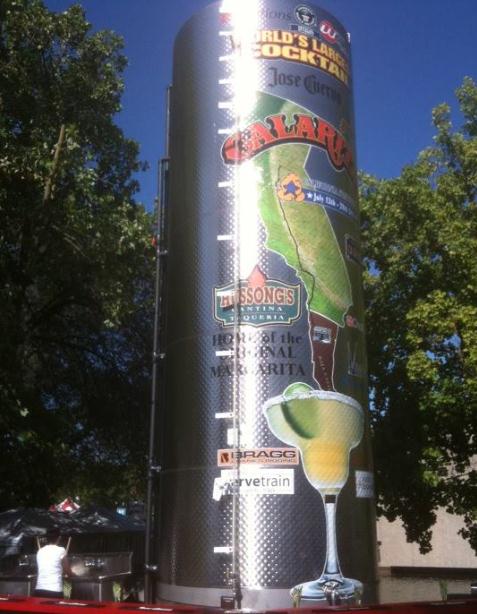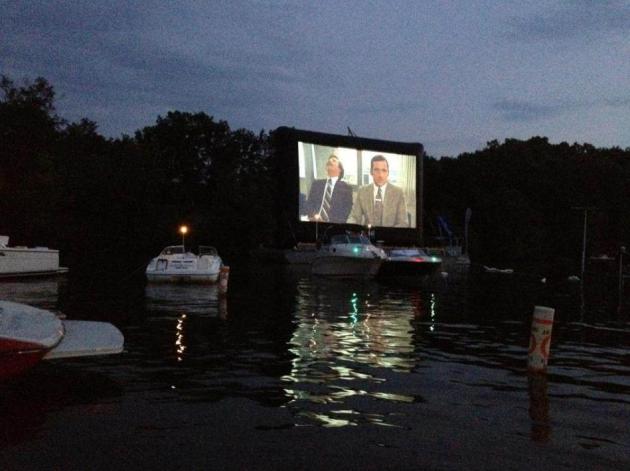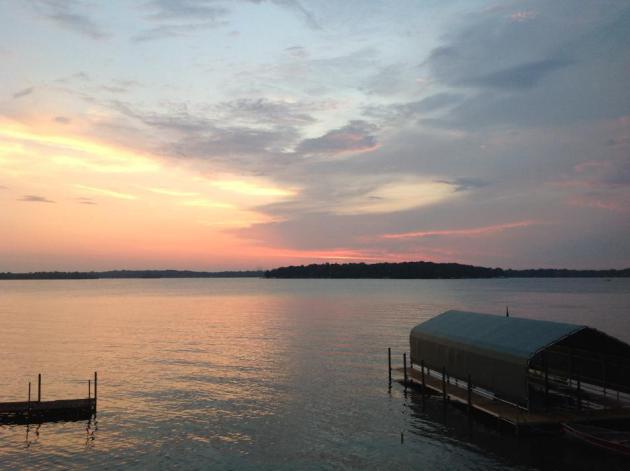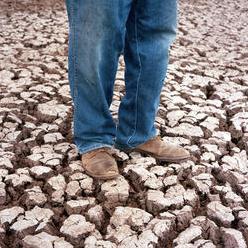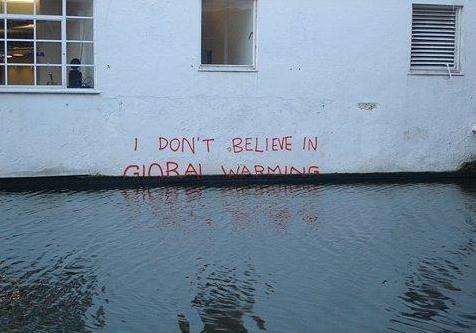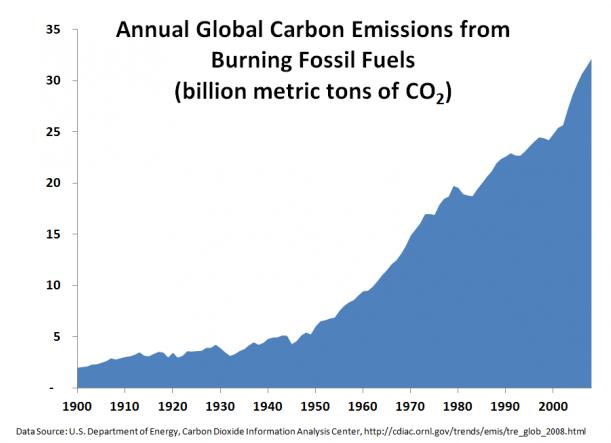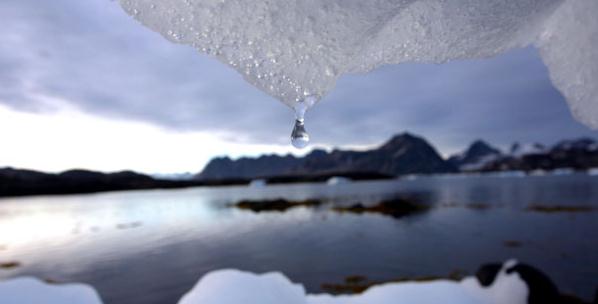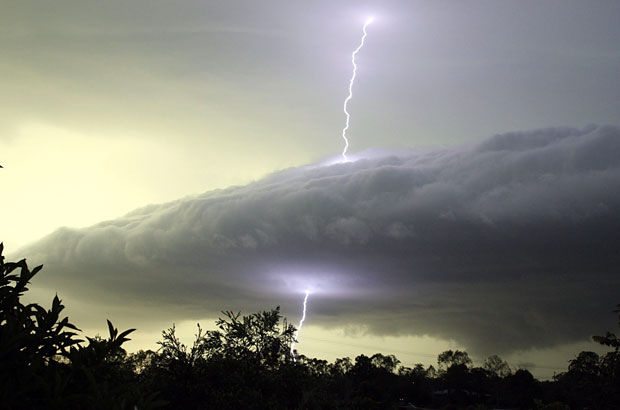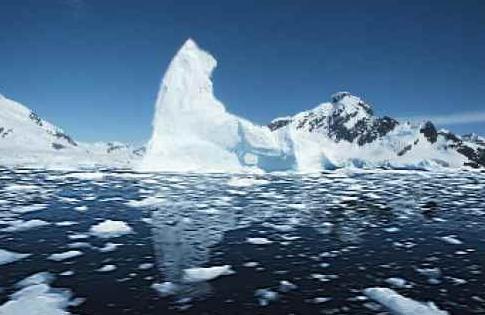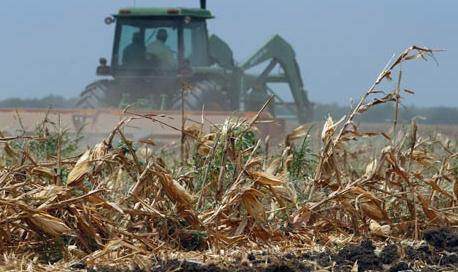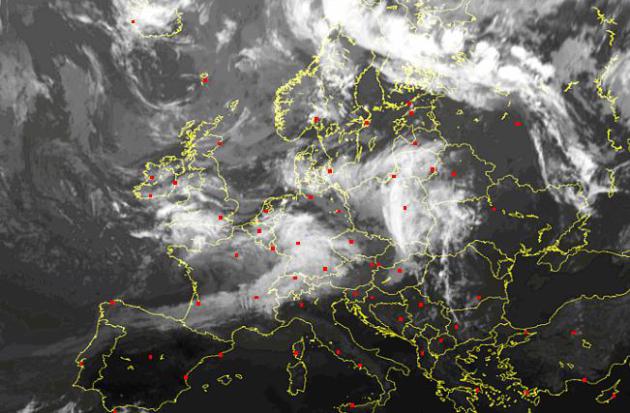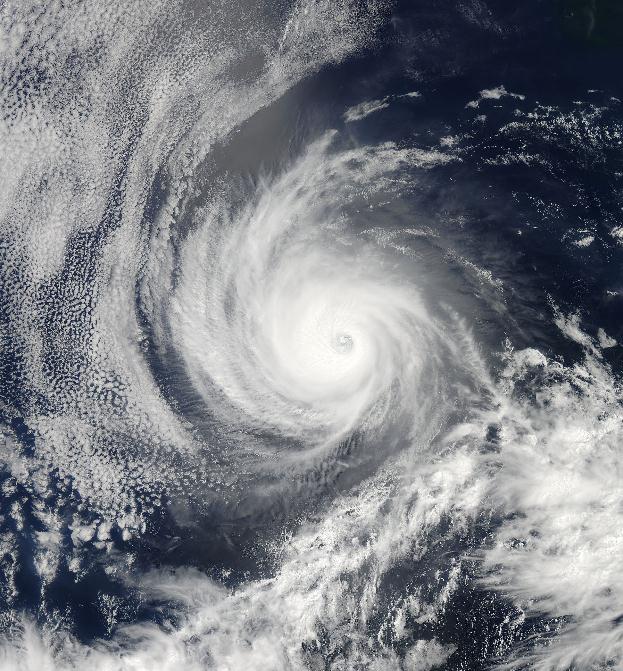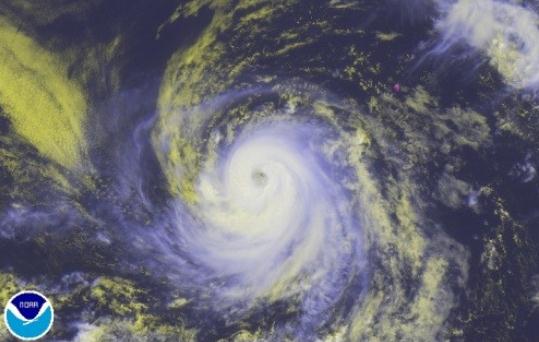"
As of Tuesday, 61% of land in the lower 48 states was
experiencing drought conditions -- stretching from Nevada to South
Carolina -- the highest percentage in the 12-year record of the U.S.
Drought Monitor....
Villwock says the drought is already larger
in scope than in 1988, and he fears it will intensify to become worse.
Many areas in the southern Midwest are reporting the poorest conditions
for June since 1988." - from a CNN article below.
Giant Solar Storm Barreling Toward Our Planet No Big Deal, Say Space Weather Forecaster (Video). Yeah - so don't sweat the heat index ok? Details from
The Christian Science Monitor: "
A solar storm
was due to arrive Saturday morning and last through Sunday, slamming
into Earth's magnetic field. Scientists said it will be a minor event,
and they have notified power grid operators, airlines and other
potentially affected parties. "We don't see any ill effects to any
systems," said forecaster Joe Kunches at the U.S. Space Weather
Prediction Center in Colorado. There's a bright side to stormy space
weather: It tends to spawn colorful northern lights as the charged
particles bombard Earth's outer magnetic field. Shimmering auroras may
be visible at the United States-Canada border and northern Europe this weekend, Kunches said."
Photo credit above: "
This image provided by NASA shows a
solar flare, lower center, erupting from the sun on Thursday. Space
weather scientists said there should be little impact here on Earth." NASA/AP
18 days/row of 90+ heat at Fort Wayne, a record for consecutive 90-degree days.
Last 2 Weeks - Percentage Of Normal Rainfall. I
can't remember seeing this much of a rainfall extreme in the span of 2
weeks. Portions of Texas (near Houston) have seen 6 times more rain than
normal in the last 14 days - while no rain has fallen over California
(not that unusual for July). But across much of the Corn Belt rainfall
has ranged from 0 to 10% of normal since July 1. Map above:
NOAA.
1,016 counties in 26 states declared disaster areas, due to severe drought conditions.
40% of America's corn crop described as in "good" condition, according to the USDA.
78% of America's corn-producing counties are in drought. USDA.
Now is when corn farmers most need rain, during the 10-12 day tassling phase.
$2 billion in insurance claims from June fires, floods and severe thunderstorms. Details from madison.com below.
Drought Threatens To Darken Obama's Reelection Plans. Here's an excerpt from
The Christian Science Monitor: "
A massive drought parching some of America’s
most productive farm regions is pushing food prices up to the point
where wilting corn plants could influence the presidential election.
More than 1,000 US counties – many of them in the grain capitals of the
Midwest – have applied for federal disaster relief, meaning they’ve
had drought conditions for more than eight weeks. Moreover, 61 percent
of the US is now considered drought-stricken, the highest percentage in
the 12-year history of the US Drought Monitor. Drought or no drought,
the US will still produce about a third of the world’s corn and will
see its third-largest corn crop ever. Moreover, a drought prognosis by Iowa State University agri-economist Chad Hart suggests that parts of the country – including Georgia and portions of Texas – are likely to see relief as the summer progresses, even as some part of the Midwest may see dry conditions worsen."
Japanese Ordered To Evacuate Flood-Hit Island. This is a remarkable video clip, courtesy of
aljazeera.com; here's an excerpt: "
Almost
a quarter of a million people have been ordered to leave their homes
in southwest Japan as heavy rain pounds the area for the third
day, leaving at least 20 people dead, officials and reports say. The
Japan Meteorological Agency warned of more landslides and floods on the
main southern island of Kyushu as rainfall of up to 11 centimetres per
hour was recorded early on Saturday. The agency warned that rainfall of
up to 80 millimetres per hour could hit parts of northern Kyushu later
in the day."
Shelf Cloud.
WeatherNation TV meteorologist snapped this photo of a shelf cloud,
marking the leading edge of severe straight-line winds, in Urbana, Iowa
early Saturday.
Ominous Wedge. Thanks to
Jeremy Valerius
for sharing this terrific shot of Friday night's squall line; the
leading edge of rain and hail-cooled air whipping up a pronounced shelf
cloud. When you see a cloud formation like this you know you're probably
dealing with strong, potentially severe, straight-line winds.
"
It was luxuries like air conditioning that brought down the
Roman Empire. With air conditioning their windows were shut; they
couldn't hear the barbarians coming." - Garrison Keillor. Photo:
womansday.com.
Drought Stretches Across America, Threatens Crops. Details from
CNN.com: "
A
dry and mild spring led Don Villwock, like all of Indiana's corn and
soybean farmers, to plant two weeks early this year. He was hopeful for
a bountiful Labor Day harvest. But the rain didn't fall and June
brought blistering heat. Now, as punishing drought grips the Midwest,
Villwock, 61, walks his hard-hit 4,000 acres in southwest Indiana in
utter dismay. Where there should have been tall, dark green, leafy
plants, there now stand corn stalks that are waist high or, at best,
chest high. They are pale in color and spindly. Fragile. Tired." (map above: U.S. Department of Agriculture).
2012 Drought Could Stall Mississippi River Barge Traffic. AccuWeather.com has the story; here's an excerpt: "
The ongoing drought
has river levels along the Mississippi River plunging to very low
levels this summer and could stall barge traffic in some areas into the
autumn if rainfall does not come soon. It was just last year when
levels along the Mississippi River and many of its tributaries were
close to record high levels. What a difference a year makes. Falling
river levels are not uncommon during the summer months in the central
and eastern United States. However, the building drought over much of
the middle of the nation currently has the mighty Mississippi running
well below normal and levels in many areas are likely to fall through
much of the summer, unless widespread rain comes."
Photo credit above:
"As levels
continue to drop along a long stretch of the Mississippi River in the
coming weeks, the risk of grounding incidents will increase." (Photos.com image)
Warmest First 10 Days Of July. Here's an excerpt from the latest installment of Dr. Mark Seeley's excellent
WeatherTalk blog, with some jaw-dropping statistics: "
For
the Twin Cities, and perhaps a few other climate stations, the first
ten days of July 2012 have been the warmest in history based on mean
temperature values. Seven of the first ten days brought daytime
temperatures of 90 F or greater (two days were over 100 F), and on five
nights the temperature remained above the 70 degrees F mark. These
values produced a mean temperature of 82.7 degrees F, or 9 degrees F
warmer than normal. The following is a list of the top ten warmest
first ten days of July in the Twin Cities area going back to 1871:"
1. 82.7 F in 2012
2. 82.4 F in 1948
3. 82.2 F in 1936
4. 81.2 F in 1989
5. 81.2 F in 1949
6. 80.8 F in 1937
7. 80.0 F in 1974
8. 79.2 F in 2002
9. 79.1 F in 2011
10. 79.0 F in 1988
*
click here for latest U.S. Drought Monitor for Minnesota, courtesy of NOAA and USDA.
Drought: Natural Disaster Declarations In 26 U.S. States. Details from
The Guardian; here's an excerpt: "
America declared a natural disaster in more than 1,000 drought-stricken
counties in 26 states on Thursday. It was the largest declaration of a
national disaster and was intended to speed relief to about a third of
the country's farmers and ranchers who are suffering in drought
conditions. The declaration from the US department of agriculture
includes most of the south-west, which has been scorched by wildfires,
parts of the Midwestern corn belt, and the south-east.It was intended
to free up funds for farmers whose crops have withered in extreme
heatwave conditions linked by scientists to climate change."
Photo credit above: "
A tractor ploughs a corn field near
Hondo, Texas. Natural disaster has been declared in many areas across
the southern United States." Photograph: Eric Gay/AP
5-Day Rainfall Forecast. Soaking, 2-3"+ rains are
predicted for Tennessee and Kentucky this week, but the heaviest rains
will probably pass just south/east of the corn belt. The Central Plains
stay dry, along with the far western USA. Map: NOAA HPC.
“
I think it’s huge that we got a judge to acknowledge that the
atmosphere is a public trust asset and the air is a public trust asset,” Abrams said. “It’s the first time we’ve had verbiage like this come out of one of these cases.” - excerpt of an article from The Climate Post and National Geographic below.
Bizbeat: Climate Change Brings Insurance Worries.
Being a farmer just got tougher - it seems we careen from one extreme to
the next, flood to drought, back to flooding. I have enormous respect
for farmers, and the risks they take to put food on our table. Here's in
interesting article from
madison.com on the liability challenges surrounding farming in a new (more extreme) climate: "
If
this summer is any indication, climate change will cost us all. From
drought-ravaged farmers filing crop insurance claims to homeowners
dealing with storm damage, the fickle weather is proving expensive.
Insurers nationwide are already facing claims of almost $2 billion from
fires, hail and thunderstorms that hit parts of the U.S. last month
Moreover, the extreme conditions are calling into question many of the
assumptions about risk and forcing insurers to adjust going forward.
“Mother Nature has always been unpredictable but when you start
factoring in climate change, it throws the actuarial numbers out the
window,’’ says Martha Lester-Mittenzwei, insurance and risk management instructor at Madison College."
Photo credit above: "
Corn leaves curl under a withering
sun in a field along Highway 14 near Arena on Thursday. Farmers have
struggled to maintain crops amid record heat and droughts this summer."
Flooding Threat Not Over Yet For Houston Area. While
much of America withers, the rain just won't stop for much of east
Texas, in stark contrast to last summer's historic drought. Here's an
excerpt from
The Houston Chronicle: "
Yet
another day of widespread rainfall across the Houston area produced
the city's most significant flooding in more than two years, prompting
rescues from flooded homes and vehicles. The worst flooding was
northwest of Houston, where more than 15 inches of rain have fallen
during the last five days, driving Cypress Creek well above its flood
stage and even higher than during Tropical Storm Allison in 2001. "It's
going to get worse before it gets better," said Francisco Sanchez, a Harris County spokesman, as Cypress Creek was still rising Friday afternoon."
Photo credit above: "
Janet and Jerry Turner
watch and wait to have water removed from their flooded home on Pine
Belt on Saturday, July 14, 2012 in Cypress." (Melissa Phillip / Houston Chronicle)
Monsoon Flooding In Phoenix. Tropical moisture surging northward into Arizona sparked serious flash flooding yesterday; details via
Facebook: "
Watch for high water over roadways!! Turn around, don't drown! (US 60 & Val Vista - csty of ADOT)."
Florida Funnel. Here are more details, via
Facebook, from the Tampa NWS office: "
Funnel cloud in Cape Coral at 2:45 pm edt (Friday). Please let us know if it touched ground and caused any damage."
Wales Weather: Met Office Raises Alert On Rain And Floods.
The forecast for the London Olympics looks wet, at least for the first
week of the games; hopefully things will improve over time. An update on
the flood risk from the
BBC: "
There
is now a "be prepared" warning for the eastern part of mid Wales, and
people are advised to take extra care. Rain is also expected to affect
the rest of Wales, with persistent rain in the north and local heavy
thundery downpours in the south. The advice comes after weeks of wet
weather which saw severe flood damage in villages around Ceredigion in
June. Earlier this week, the Prince of Wales met victims of the flooding
and emergency services involved in the rescue operation."
* satellite image above courtesy of
sat24.com.
NASA MODIS Image Of The Day: "Emilia". Here's a good overview of Pacific Hurricane Emilia from
spaceref.com: "
The
fifth named storm of the 2012 Pacific hurricane season, Emilia quickly
became the strongest storm of that season to date, peaking as a
Category 4 Hurricane on the Saffir-Simpson hurricane Wind Scale on July
10, 2012. On that day, Hurricane Emilia packed maximum one minute
sustained wind speeds of 140 mph and a barometric pressure of 945 mbar.
The Moderate Resolution Imaging Spectroradiometer (MODIS) aboard NASA's
Aqua satellite captured this true-color image of Hurricane Emilia on
July 11, at 2120 UTC (11:20 a.m. EDT)."
Hurricane Fabio. A minimal Category 1 hurricane, Fabio poses no threat to land. Just our pride.
Hurricane Hunters Fly Into The Eye Of The Storm For Science - And TV. Here's an excerpt of an interesting article at
wired.com: "
To
gather information on violent storms, the National Hurricane Center
relies on tools like sensors and satellites. And some badass Air Force
Reserve pilots. The 53rd Weather Reconnaissance Squadron flies directly
into the world’s worst storms to collect meteorological data. And like
any dangerous job involving weather and vehicles, they now have a
reality show: Hurricane Hunters recently premiered on the Weather
Channel. “What I do is sort of crazy to the rest of the aviation world.
Pilots are trained to avoid weather—we’re actually flying into the most
extreme storms,” says Sean Cross, a pilot featured on the show who has
flown for more than 11 years with the 53rd."
Minnesota: 5th Best State To Live In The USA? Thank you
CNBC,
for sharing our dirty little secret: clean air, abundant lakes, smart
locals with an amazing work ethic and a kind word. Yes, I'm waving the
flag, but there's nowhere else on Earth I'd rather live (and I've been
around the block, trust me). Here's an excerpt:
2012 Quality of Life Points: 250 out of 350
2011 Quality of Life Rank: 8
"
Minnesota is the Land of 10,000 Lakes, and all that natural beauty
contributes to the quality of life. But there is more to the state than
that. The home of the Mayo Clinic is one of America’s healthiest
states. The crime rate is among the lowest in the country. Air quality
is among the best, too. From the cosmopolitan Twin Cities to the remote
beauty of the North Woods, Minnesota has it all."
A 500 Mile Electric Car? CNN.com has the story - here's an excerpt: "
Despite their green credentials, electric cars still come up short against their petrol-powered cousins when it comes to range
-- how far they go before the battery needs recharging. But a new
"range-extended" electric vehicle (EV) equipped with the latest fuel
cell technology is promising to close the gap going 500 miles (800
kilometers) without refueling, say its developers. Bringing together the
expertise of three Danish companies, the Modular Energy Carrier concept
(MECc) utilizes bio-methanol -- a biofuel which can be harvested from a range of sources including natural gas -- to improve the competitiveness of EVs."
Another Look At "Cold Fusion." Remember the cold
fusion scandal back in the 80s? Turns out there may be something to this
new and revolutionary way of generating electricity anyway. Details
from
e-catworld.com; here's an excerpt and link to a 60 Minutes video clip: "
There’s an announcement on the CNBC web site
of an upcoming program that will feature cold fusion. There will be a
program on Scientific Breakthroughs on Tuesday, July 17th at 9:00 p.m.
ET. Here is the description:
Cold Fusion Is Hot Again
A report on cold fusion – nuclear energy like that which powers the sun,
but made at room temperatures on a tabletop, which in 1989, was
presented as a revolutionary new source of energy that promised to be
cheap, limitless and clean but was quickly dismissed as junk science.
Today, scientists believe that cold fusion, now most often called low
temperature fusion or a nuclear effect, could lead to monumental
breakthroughs in energy production.
"Now CNBC is a cable financial network, and 60 Minutes is a CBS
show, so there must be some kind of partnership between the two
companies. The explanation of ’60 Minutes on CNBC’ is, “CNBC brings you
the latest on these classic stories with updates and never before seen
footage of these award winning business news stories”
MIT Develops New Glasses-Free 3-D TV Technology.
Wait, I won't have to wear those dorky glasses in the future when I'm
watching Fox News in 3-D? Something to look forward to. Details from
gizmag.com: "
Though
3D movies have been around for a while, the experience of visiting a
cinema to catch the latest blockbuster is dampened by unwieldy glasses
and the limitation of only one fixed perspective being offered to all.
The illusion of depth is present, but this is far removed from the
hologram-like, multiple-perspective experience which would truly wow
movie-goers. MIT's Media Lab’s Camera Culture group proposes a new
approach to 3D images that promises glasses-free multiple-perspective
3D. Perhaps best of all though, MIT's technique uses inexpensive
existing LCD technology, clearing the way for the tech to be
implemented into TV's."
Your Phone May Soon Knew Where You're Going Before You Do.
As my smartphone quickly becomes smarter than I am, I'm hoping it will
automatically answer my calls, texts and e-mails. I'll just kick back
and read a "book" while it's doing everything for me, including mapping
out the rest of my day.
Gizmag.com has another intriguing story; here's an excerpt: "
Phones obviously already know where we are and where we have been, thanks to GPS and other clever positioning technologies.
Now, thanks to an algorithm developed by researchers at the University
of Birmingham, your smartphone may soon be able to make accurate
educated guesses as to where you’re going to be in 24 hours time. And
here’s the dirty trick responsible for the algorithm’s future-telling
powers: it spies on your friends and connects the dots where necessary."
The Forecast Calls For Hiccups. I sympathize - and there's not much you can do when your body goes temporarily haywire. Details from
TVSpy.com: "
Kalee Dionne, the morning meteorologist at Birmingham CBS-affiliate WIAT,
was struck with a case of the hiccups during her weather report this
morning. “Sorry, I have the hiccups,” Dionne cautioned viewers at the
beginning of her forecast. Dionne got through to the end of the report
before asking, “Does anyone know a cure for hiccups?” Video inside… "
World's Largest Cocktail.
And where on Earth would you find the world's largest cocktail. No, not
Vegas - California! Details from The California State Fair, via
Facebook: "
Nicora
did it! He broke the world record for largest cocktail! Come get your
margarita at the fair, either on the rocks straight from the tank or
blended from any margarita booth at the fair. How many margaritas do
you think this tank holds?"
Movie Night At Big Island. In spite
of lightning nearby a few brave boaters turned out for a screening of
"Anchorman" at Big Island, on Lake Minnetonka, just west of Minneapolis. Photo courtesy of Chris
Anthony, who's barge held up the screen - no small feat!
Another Heat Spike
I find it ironic that Barry Bonds will be
remembered for a "weather on steroids" analogy. I'd like my weather
SUPER-SIZED please! A 1-in-100 year flood in Houston (following the
worst drought ever last summer). The west is burning (literally) while
scorching, desert-heat sweeps into the Plains and Midwest.
A friend in Phoenix says its a "dry heat". So is my oven, but I still wouldn't stick my head inside.
Mid-90s will be bad enough today, but many of
the ingredients are falling into place for the third 100-degree high of
the summer tomorrow: bright sun, south/southwest wind, a dip in dew
point and drying topsoil. The sun's energy can go into heating up the
air vs. evaporation.
100-105 F. heat Monday; temperatures Tuesday may
approach 100 over southern Minnesota; a few models hinting at a few
cooling T-storms as (slightly) cooler air approaches. Any midweek relief
will be tepid - another surge of heat arrives late week. A 95+ Saturday
gives way to a cooler front next Sunday.
Any rainy relief for farmers worried about the
worst drought since '88? The heat has pushed frontal boundaries into
Manitoba. That's where it's raining. It's too hot to coax many puddles
out of this sky.
Climate Stories...
“
An investment in knowledge pays the best interest.” - Ben Franklin
Study: Texas's Hellacious 2011 Summer Is A Prime Example Of Loaded Climate Dice. Details from
dallasobserver.com; here's an excerpt: "
Our
record-busting summer 2011 continues to be an object of fascination to
climate scientists all over the world. Alongside floods in Thailand,
drought in Eastern Africa and the European heat wave, the driest,
hottest year in recorded Texas history has provided a case study for
gauging the influence of climate change on weather extremes. Researchers
from Oregon State University, the University of Oxford and Exeter
scrutinized last summer and -- with data from 2008 (the most complete
set we have) and comparable La Niña years in the 1960s -- ran them
through a set of computer models. When they threw the results on a
scatter plot, the spread was dramatic: Texas was 20 times more likely to
see heat extremes in 2008 than in years with similar oceanic
conditions in the '60s. They found much the same for drought."
Photo credit: Brandon Thibodeaux
Protecting The Business: Why Conoco, Caterpillar, And Exxon Resort To Double-Talk On Climate Change. Here's an excerpt of a story from
Huffington Post: "
When
Galileo promoted the idea that the earth revolves around the sun in
the 1600s, the church rejected his claims as heresy and subjected him
to a lifetime of house arrest. Understandably, such theories could
contaminate the minds of good Christians, and would therefore be bad for
business. Four hundred years later history is repeating itself, albeit
with corporations (mostly those deeply invested in fossil fuels) as
the ones seeking to discredit the scientific community in hopes of
protecting their economic self-interests. In the recent study A Climate of Corporate Control,
the Union of Concerned Scientists uncovered several S&P 500
companies that had "made statements in support of climate science and
policy in some public venues, while spreading misinformation on climate
science or hindering science-based policy elsewhere." In fact, of the
28 companies researched, 21 of them acted in direct contradiction to
their stated positions on climate change, largely employing methods that
skirted direct accountability (e.g. sizeable political contributions,
lobbying expenditures and the funding of trade groups and think tanks).
Of the most egregious offenders are companies such as Conoco
Phillips, Caterpillar Inc., Exxon Mobil and Peabody Energy Corporation."
Global Carbon Emissions. Graph above courtesy of the
U.S. Dept. of Energy
and the Carbon Dioxide Information Analysis Center. The U.S. DOE
estimates approximately 1 trillion tons of CO2 and methane have been
released into the atmosphere, worldwide, in the last 50 years.
"
The Carbon Dioxide Information Analysis Center estimates
that about 76 percent comes from the combustion of coal and oil, and
another 20 percent from natural gas. The remaining amounts to round up
to 100 percent come from cement production and gas flaring." - source
here.
'
Would gravity be overturned if we could see Sir Isaac Newton’s personal letters?' -- Scott Mandia
Poll: Most Believe In Climate Change. Details from
politico.com; here's a snippet of the article: "
A
majority of Americans say they think climate change is real, according
to a new poll on Friday. Six in 10 believe weather patterns around the
world have been more unstable in the past three years, The Washington Post/Stanford University poll
found. Almost as many people said it has been hotter on average in
that time than ever during the same period. And as for what the two
presidential candidates want to do about climate change, almost half of
respondents say President Barack Obama wants to take a lot of
government action on global warming, while just 11 percent say they
believe that is one of Mitt Romney’s goals."
Photo credit above: "
About two-thirds of those surveyed said the U.S. should be a leader on the issue." AP Photo
Temperature Climbing, Weather More Unstable, A Majority Says In Poll. Details from
The Washington Post; here's an excerpt: "...
Americans
polled by The Post and Stanford do see climate change as occurring:
Six in 10 say weather patterns around the world have been more unstable
in the past three years than previously, a perception that’s changed
little since 2006. Nearly as many also say average temperatures were
higher during the past three years than before that. In terms of what
can be done about it, about 55 percent say a “great deal” or “good
amount” can be done to reduce future global warming. At the same time,
60 percent of those polled say it will be extremely or very difficult
for people to stop it."
5-Mile-Long Landslide In Alaska National Park; Warming Eyed As Possible Culprit.
MSNBC.com has the story; here's an excerpt: "
A
massive landslide sent tons of rock and debris tumbling more than five
miles down a glacier in Alaska, the National Park Service reported in
an event that could be yet another sign of a warming world. Located in a
remote area of Glacier Bay National Park, the slide was so big it
registered on earthquake monitors as a magnitude 3.4 event. Officials
noticed the monitor blip on June 11 but it wasn't until July 2 that a
pilot passing over the site took photos that showed just how large it
was, Glacier Bay National Park announced on its Facebook page."
Photo credit above: FlyDrake.com via Glacier Bay National Park. "
Rock and debris from a landslide lie along five miles of what had been an ice-white glacier inside Glacier Bay National Park."
As Country Breaks Heat Record, Studies Analyze Climate Connection. The story from
National Geographic, here's an excerpt: "
The same week the continental United States broke its record for the hottest six months in a calendar year, the United Nations announced 2011 was among the 15 warmest so far. Climate change may have increased the chances of the types of extreme weather seen in 2011, and may have been heavily influenced by a weather pattern called La Niña. The odds of such record U.S. heat being a random coincidence—while not 1 in 1,594,323, as the National Oceanic and Atmospheric Administration’s National Climatic Data Center said in a new report—are perhaps on the order of 1 in 100,000. One NOAA scientist claims there is an 80 percent chance the record heat can be attributed to climate change. Meanwhile, Meteorologist David Epstein called the extremes “simply a reality of nature.”
Environmental Threats: Antarctica In Danger Of Climate Change, Ocean Acidification And More.
Huffington Post has the story; here's an excerpt: "
Antarctica
and its surrounding waters are under pressure from a variety of forces
that are already transforming the area, scientists warn. The most
immediate threats are regional warming, ocean acidification and loss of
sea ice, all linked to global levels of carbon dioxide. Sea ice cover,
crucial to the survival of virtually every animal that lives on and
near the continent, already has been reduced by warming, according to a
new study published in the July 13 issue of the journal Science.
Visits by tourists, researchers and other people also threaten to change Antarctica, as does the harvesting of animals like krill that are key to the Antarctic food chain."
War And Climate Change. Here's an excerpt of a thought-provoking piece in
The Huffington Post: "
...Social
change of real value is slow-going indeed. How do we manifest
responsibility to the planet? A serious consensus is building across the
globe that doing so is crucial, that the weather extremes of recent
years are no less than global warming in action, the result of centuries
of unbridled, industrial-age irresponsibility toward the planet, and
something fundamental has to change in how we live our lives and sustain
ourselves, but our leadership, certainly in this country, seems
incapable of addressing an issue of such complexity. President Obama,
who campaigned as a new kind of leader, perpetuates, in the name of
national security, assassination by drone. Meanwhile, every real issue
of national security, including climate change, is ignored. Every
problem we face either has an us-vs.-them solution or no solution at
all -- indeed, no existence as a problem. A year ago, when wildfires
ravaged the state of Arizona, the best John McCain could do was blame
it on illegal immigrants. We're stuck in a paradigm of domination, but
we can't fight our way out of the ecological disaster we've brought on
ourselves. Perhaps, having brought the hell of war to the Middle East
over the last two decades, we're symbolically reaping what we've sown."
Climate Change Will Make The World Endear Geoengineering.
I'm not sure endear is the right word. Tinkering with the atmosphere to
try to "fix" our climate problem? What can possibly go wrong? The story
from
groundreport.com; here's an excerpt: "
The
appropriate time for large scale deployment of geoengineering will be
something like now, that the world experiences extreme weather events.
‘Geoengineer the climate, engineer it to save us’ will be the
prevalent spout from people because of hard to bear recurrent extremes
of devastating magnitude. The losses and impact from weather extremes,
of the past few weeks around the world, has prompted serious concerns.
Rich and powerful nations are being hurt likewise small and developing
nations. Similar weather occurrences have rocked some of the affected
places previously, and made news but was seen as a snippet of future
climate change."
U.S. Wastes More Energy than China, Europe. Some interesting statistics from
The Los Angeles Times; here's the introduction to the story: "
In
the U.S. – land of the gas-guzzler SUV and 24/7 air conditioning –
energy efficiency isn’t known as a strong suit. The country’s power
management efforts are so poor that a new report ranks it near the
bottom of the pack of major economies. On a list of a dozen countries,
which together account for 63% of global energy consumption, the U.S.'
efficiency efforts are ranked in lowly ninth place. With a score of 47
out of 100, the U.S. outpaces only Brazil, Canada and Russia, according to the report from the nonprofit American Council for an Energy-Efficient Economy, known as ACEEE."
Photo credit above: "
Traffic piles up in Los Angeles. The
U.S. ranks last in energy efficiency in the transportation sector,
according to a new report from ACEEE."
(Al Seib / Los Angeles Times)
